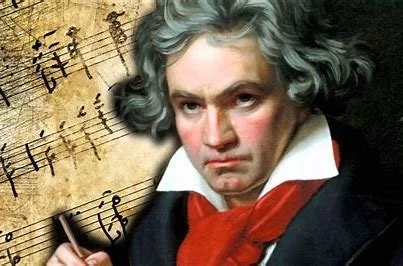Classical Era (1750 - 1820)
The Classical Era is approximately from 1750 to 1820. In the mid 1700s, European arts and architecture experienced the resurrection of the ancient classical world, especially those of ancient Greece. Simple and clear styles were revered and flourished. Music during the Classical era is characterized by:
Simpler, clearer texture than Baroque music
Mainly homophonic - a clear melody line accompanied by chords (versus Baroque’s polyphonic music with layered melodies)
Piano, a much more expressive tool, replaced harpsichord and organ as the primary keyboard instrument
Orchestra increased significantly in size and the sound became more powerful
Some well-known Classical composers:
Austria: Joseph Haydn, Wolfgang Amadeus Mozart
Germany: Christoph Willibald von Gluck, Ludwig van Beethoven
-

Joseph Haydn (1732-1809)
Haydn was an Austrian composer and pivotal figure in the development of Classical period music. He was regarded as the father of the string quartet, which is a chamber music ensemble with two violins, a viola and a cello. Additionally, with more than 100 symphonies, he was widely revered as the first great symphonist. Aside from symphonies, he also wrote 68 string quartets, 47 piano sonatas, 20 operas and many other works. A few of his well-known compositions include: ‘String Quartet, Op 64’, ‘The Farewell Symphony’, and ‘The London Symphony’.
-

Wolfgang Amadeus Mozart (1756-1791)
Mozart was an Austrian composer and pianist. He is one of the most influential composers in Western music history. Mozart was a child prodigy: he composed his first work at age 5, performed piano at royal court at 6, and wrote his first true opera at 11. Mozart composed over 600 works for all the music genres of his day, including symphonies, concertos, sonatas, chamber music, and operas. Transcending time, Mozart’s music continues to be enjoyed to this day. Some familiar works include: ‘The Magic Flute’, ‘Symphony No. 41’, and ‘Piano Concerto No. 21’.
-
Ludwig van Beethoven (1770-1827)
Beethoven was a German composer and pianist. He is widely respected as one of the greatest composers in Western music history. Keeping and stretching the classical style forms, while bringing emotional depths to his music, Beethoven is a ‘bridge’ between the Classical and Romantic eras. He is also an inspiration, as he struggled with deteriorating hearing but kept composing with determination. He wrote over 600 works, with 9 symphonies, 32 piano sonatas, 5 concertos, 16 string quartets. More than 200 years later, Beethoven’s music retains its presence. A few renowned works include: ‘Fifth Symphony’, ‘Ninth Symphony’, and ‘Moonlight Sonata’.
Haydn - The Farewell Symphony, No. 45, IV. Finale
Conducted by Igor Gruppman
Haydn was a kind and optimistic person with a great sense of humor, and his character is often evident in his music. Towards the end of the ‘Farewell’ Symphony, the musicians leave the stage one by one after their parts end. This was Haydn’s diplomatic and witty way to tell his patron that the musicians had been away from home for too long and they wanted to go home.
Mozart - The Marriage of Figaro, Overture
Orchestra of The Royal Opera House, conducted by Antonio Pappano
Beethoven - Symphony No. 5, First Movement
Boston Philharmonic Orchestra, conducted by Benjamin Zander

